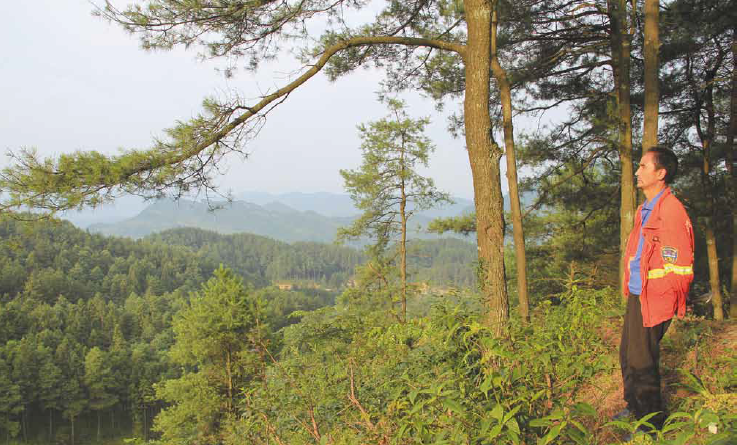
A military retiree has made it his life's pursuit to protect a wide swathe of forest in Guizhou province, Yang Jun and Wang Xiaodong report.
For the past 34 years, Tian Renyi has patrolled Juchi Mountain in Guizhou province with an ax and a wooden stick in case he has to fend off a wild animal like a bear or cougar. But his so-called weapons also serve to deter a two-legged nuisance: tree poachers.
"Every tree in the forest is as precious as my life, and I would venture my life to stop tree poachers," he said.
 |
|
Park ranger Tian Renyi has watched over Juchi Mountain in Guizhou province for more than three decades. XIAO YUYE/ FOR CHINA DAILY |
Tian, 63, began working as a ranger at Juchi Mountain Forest Farm in Yanhe county, Guizhou province, in 1981 — shortly after he retired from the People's Liberation Army — upon hearing of the illegal poaching activities from the farm's staff members.
On his first day on the job, he traveled two hours from the village of Zhongzhai upon mountainous trails to get to the 566-hectare forest farm.
"I was awake the whole night on my first day on the forest farm, listening to the roaring of various wild animals on the mountain," he said.
The next day, Tian woke up to a land of endless green. He said that at that point, he decided he would take care of the forest for as long as he could.
"I was planning to take care of the forest for just a few years," Tian said. "I did not expect I would work here for more than 30 years."
A major part of his work is to fight against tree poachers from nearby villages, he said.
"The villagers often sneak into the forest and cut down the trees during the summer nights," he said. "When it is sunny I would sleep on the top of the mountain and I would throw stones to drive intruders away when I heard noises at night."
In recent years, due to improved law enforcement, economic growth and education, tree poaching is becoming less common because many villagers have migrated to bigger cities to work, he said.
While Tian faces fewer tree poachers, he is always on the alert for fire hazards in the forest.
He said during Chinese New Year, many villagers come to the graveyards situated next to the forest farm to pay their respects to ancestors.
"This period is the busiest season for me," said Tian, adding he advises visitors not to burn paper money during their graveside tributes.
"I would stay in the graveyards through the night until everybody is gone," he said.
After his parents died a few years ago, Tian has lived alone, which is how he prefers it.
"Some people say I am a fool," he said. "But I do not think so. I have my pursuit and the point of my life is in this forest. This forest is all I have."
Partly due to Tian's efforts, the forest has never been struck by a fire in 34 years. Tian also plants trees to expand the forest.
Until a few years ago, he lived in a thatched house on the forest farm's grounds. He now lives in a wooden abode that a villager sold to the farm.
The 10-square-meter shelter is divided by a wooden board into a bedroom and a kitchen. He only has a bed, a few cooking utensils and some dry vegetables to call his own.
He descends from the mountain every five days to buy necessities from nearby villages, said Tian Jingwu, chief of the forest farm.
"Life on the forest farm is tough," he said. "There is no electricity and no entertainment."
Tian Jingwu said with many villagers from around the forest migrating to cities to find work, more farmlands have been deserted.
"The local forestry bureau is planning to cooperate with these villagers so we may turn the farmlands to forests, which could in turn financially benefit the villagers," he said.